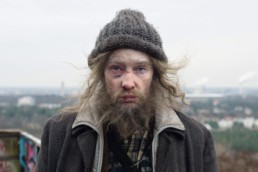'The Bad Batch' Review: A Bizarro Burning Man Take on the Border Crisis
Bringing "Bad" back to the big screen for her highly anticipated sophomore film is Ana Lily Amirpour, the visionary who made black and white Vampire Spaghetti Westerns a thing.
Amirpour trades the streets of Bad City for the barren desert of Texas in The Bad Batch, a meditative and highly audacious cannibal film that makes Burning Man look like your grandmother's tea party. Check back tomorrow for our exclusive interview with Amirpour and actress Suki Waterhouse.
Our heroine is Arlen (Suki Waterhouse), a young woman who has been dumped in the desert after spending an undisclosed amount of time in a detention facility. Disoriented and penniless, her stamina is no match for unrelenting sun as she decides to let her guard down for a quick nap in a conveniently abandoned car. It's not long until a group of ragtag cannibal misfits find Arlen and take her to their base camp. Her desperation to escape literally costs Arlen an arm and a leg as she quickly learns that it's every man, or in this case, woman, for herself in the Bad Batch.
Elements of what made Amirpour's first film, A Girl Walks Home Alone at Night, so successful are replicated here– strong female protagonist, gritty skate culture and trendy soundtrack, including songs from Die Antwoord and Culture Club, and all-around cool vibes. Perhaps too cool at times, but how can it not be coming from distributors like Vice, NEON, and Annapurna?
Ana Lily Amirpour's moody, high-style horror flick is an unconventional watch, but for as tough and tireless as the premise is, the cinematic style of the film itself is quite idyllic.
Arlen encounters many characters as she wanders through the barren landscape, including the big and burly Miami Man (Jason Momoa), his quiet yet independent daughter, Honey (Jayda Fink) and The Dream (Keanu Reeves), the idolized patriarch of the desert camp called Comfort. The subsidiary cast of kooks like Hermit (Jim Carrey) and The Screamer (Giovanni Ribisi) are unexpected but welcomed additions that further round out Arlen's reality. Like a badass Dorothy Gale from The Wizard of Oz, Arlen just wants to go home and uses these characters she meets along the way to help her get there.
The audience isn't given the luxury of knowing Arlen's backstory, or how she wound up in the Bad Batch in the first place, but character development clearly wasn't the focus here. We are dropped into a dystopian desert without knowing how we got there or where we're going, but we blindly buckle up for the ride. By default, we root for Arlen's success because the odds are against her, plus she is fighting to survive with a missing left arm and leg, I'd venture to guess, however, that a backstory would have made the audience further emotionally invested.
Ana Lily Amirpour's moody, high-style horror flick is an unconventional watch, but for as tough and tireless as the premise is, the cinematic style of the film itself is quite idyllic. Minimal dialogue and long, sweeping shots of the vast wasteland makes for a meditative watch despite the blood, guts, and gore. Lingering shots of barren desert-living mixed with the effortlessly cool and all-around badass Suki Waterhouse makes The Bad Batch an artistic vision, or dare I say... dream?
'The Bad Batch' is rated R for violence, language, some drug content, and brief nudity. 118 minutes. Opening this Friday at ArcLight Hollywood and On Demand, Amazon and iTunes.
'Out of State' Review: Hula Heals Convicted Criminals
Competing for the title of Best Documentary at the festival this year is "Out of State," a story about personal change and second chances.
Director Ciara Lacy follows two inmates as they learn about their rich cultural heritage while locked up behind bars, and the transition from a life of controlled routine to total freedom back on the beautiful island of Hawaii. Exposing the wisdom and hardships they gained throughout their turbulent journey, "Out of State" is a film worth rooting for.
Since the mid-1990s, Hawaii has sent most of their male prisoners to for-profit prisons in the United States, due to overcrowding. The men profiled, David and Hale, had been locked up at the Saguaro Correctional Center in Eloy, Arizona, a unit specifically built for men who committed crimes in Hawaii. Being held thousands of miles away from home, the men grow to see their incarcerated peers as brothers. They learn ancient Hawaiian traditions behind bars, including dance routines, chants, and other rituals that they had previously disregarded for a life of crime and substance abuse.
They learn ancient Hawaiian traditions behind bars, including dance routines, chants, and other rituals that they had previously disregarded for a life of crime and substance abuse.
Only about the first quarter of the film is dedicated to the prison system (personally, I would have loved to explore that a bit more), but the true test lies in how the men act once released. David's release seems promising, turning towards spirituality and keeping the traditions he learned close. He is wise when talking about his "second chance" and his appreciation for the friends and family that love him unconditionally.
Ciara Lacy is a native Hawaiian and her approach in humanizing and sympathizing with convicted criminals is a testament to her directorial skills. The film itself is a straightforward character-driven documentary, but what makes it special is the common thread of personal growth and the universal desire to better oneself.
“Out of State” premiered at the 2017 LA Film Festival on June 18.
'Funeral Parade of Roses' Review: New 4K Restoration is Still Erotically Charged
Cinelicious Pics and The Cinefamily have breathed new life into the 1969 black and white experimental film, Funeral Parade of Roses.
The new wave Japanese film, from director Toshio Matsumoto, had been banned from American theaters for years, but since its recent 4K restoration, this work will now celebrate its re-release with a special screening at The Cinefamily beginning this Friday.
Drawing inspiration from the subversive world of underground drag queen bars and the mischief that surrounds them, Funeral Parade of Roses is an intoxicating watch from start to finish. The protagonist, Eddie (Pîtâ), a young, doe-eyed hostess at Bar Genet, becomes entangled in a violent love triangle with club owner Gonda (Yoshio Tsuchiya) and the reigning drag queen Leda (Osamu Ogasawara). Amongst the sex and violence, Eddie worries for her safety but that doesn't stop her from participating in both drugs, booze, and naked dance parties that are overtly present in the Tokyo night scene. The further the film develops, the wilder the ride becomes, including an inadvertent "Oedipus Rex" moment that is so shocking it may be tempting to cover (or try to poke out) your eyes.
Influenced by many, but still the reigning champion of boundary-pushing movies.
Funeral Parade of Roses has become a legendary film in its own right- influencing Stanley Kubrick's A Clockwork Orange and portraying the tone of the counterculture trans scene of Tokyo in the 60s. Chaotic edits that blend documentary interviews– questioning characters about their decision to "become gay"– with avant-garde performance art, and film-within-a-film moments, "Funeral Parade of Roses" is most definitely not a straightforward watch.
This queer, art-house cinematic masterpiece was ahead of its time in 1969, and the argument could be made that it remains that way, even today. While the normalization and societal acceptance of trans people are becoming more mainstream, the technique and way in which Matsumoto created this buzzy, gritty, and subversive world have still gone unmatched in modern cinema. Influenced by many, but still the reigning champion of boundary-pushing movies, Funeral Parade of Roses includes a line of dialogue towards the end that provides the most accurate summary - "Such a unique film with cruelty and laughter."
"Funeral Parade of Roses" is not rated. 107 minutes. Opening this Friday at The Cinefamily with additional cities to follow.
The 6 Things We’re Looking Forward To Most at This Year’s LA Film Festival
The 2017 LA Film Festival kicks off this Wednesday, and we here at Cinemacy can’t wait to return to the fest filled with promising screenings, conversations, red carpet events, and much more (free yoga on the festival lawn!).
Running through next Thursday, the 22nd annual LAFF showcases 48 feature films, 51 short films, 15 high school short films, and 10 short episodic works- representing 32 countries. In anticipation of the event, Cinemacy’s staff writers have made a list of the six things we’re most looking forward to. If you can’t make it out, be sure to follow Cinemacy as we cover the festival from start to finish on Instagram , Twitter , and Facebook!

Bryce Dallas Howard: Coffee Talks Actors at 2015 LA Film Festival
Morgan’s pick: Coffee Talks
One of the most alluring events that the festival offers aren’t even the movies– but rather, the conversations with some of the industry’s inspiring talents. Taking place at the Kirk Douglas Theatre on 6/18, the Coffee Talks are a series of one-hour conversations with a panel of different people working in the industry, including directors, actors, screenwriters, and composers. These events have always been a highlight for us, and this year we couldn’t be more excited to sip our latte with director Justin Simien (Dear White People), Zal Batmanglij (The OA, The East), and more to be announced.

Still from G-Funk
Ryan’s pick: G-Funk
While I admit that I’m not the most well-versed fan of hip-hop music, I, like most people, grew to see another side of the rap music scene in 2015’s summer breakout hit, Straight Outta Compton, which cinematized an untold story about this pivotal moment in art, culture, politics, and music. One of the major artists of this late ‘80s–early ‘90s era LA rap scene was Warren G. The documentary G-Funk chronicles the music’s rise and friendship between Warren, Nate Dogg, and Snoop Dogg as they create the essential style of West Coast hip hop. What’s more– the film was directed, shot, and edited by Chapman University graduates (of which Cinemacy’s staff writers hail from). G-Funk screens at the Theatre at the Ace Hotel on 6/16, to be followed by a live performance by none other than Warren G himself.

Monkey Business
Nelson’s pick: Monkey Business: The Adventures of Curious George’s Creators
Dare I say I’m curious to see how this film is? Unbeknownst to me, the creators of the timeless children’s storybook character “Curious George” escaped Nazi Germany in order to bring their character to light. Monkey Business is a multimedia documentary, and hopefully, my enthusiasm for the wave of recent boundary-pushing non-fiction films (Nuts!, Tower) carries over to this unique film, playing on 6/17. Further assuring that Monkey Business is something of quality, the film has already been picked up for distribution by indie favorite The Orchard.

Royalty Hightower
Morgan’s pick: And Then I Go
Twelve-year-old actress Royalty Hightower first hit the film scene in the 2016 film The Fits, where she gave a tour de force performance as the protagonist, Toni. In my review of the film, I stated, “Remember her name, Royalty Hightower is just getting started,” and I’m happy to say that I was right: In And Then I Go, playing on 6/16, Hightower appears alongside Melanie Lynskey, Justin Long, and more in the drama about the hardships of adolescence and the powerful bonds of friendship.

Still from Patti Cake$
Ryan’s pick: Patti Cake$
It seems like I’m looking forward to a hip-hop themed festival. Following G-Funk, the fictional movie on my must-see list is one that I missed when it made its premiere at the Sundance Film Festival. Patti Cake$, which screens on 6/19, tells the story of an unlikely rapper who finds her voice as a one-of-a-kind hip hop legend. This looks like a confident, brash, and entertaining film, which is always fun to watch with an audience.

DJ party at the 2016 LA Film Festival. Courtesy of Film Independent
Nelson’s pick: Anything (which takes on a double meaning)
First, the Mark Ruffalo produced drama, Anything, which features longtime character actor John Carroll Lynch (The Founder, Fargo) in a rare leading role. Lynch’s protagonist, named Early Landry of all things, moves in with his sister after losing his wife and finds himself attracted to her neighbor, Freda. While we can imagine what sort of complications can arise from this synopsis, I’m sure that there’s much more ahead for this film, playing on 6/17.
The second part of "Anything" is the festival itself. LAFF is an amazing event for discovering hidden gems. I saw my favorite film of 2015, Victoria, by complete chance without knowing anything beforehand and it is still a film I frequently mention today. This atmosphere of unknown excitement is what attracts me more than any specific title. You’ll be in good hands with almost "Anything" you see, so take this as a chance to seek out new, independent films!
To see all the latest lineup announcements, including pass, ticket and event information, visit tickets.lafilmfestival.com.
'Opening Night' Review: This Musical Comedy is Worth a Standing Ovation
This review originally ran on June 7th, 2016 during the LA Film Festival
Birdman meets 30 Rock in director Isaac Rentz's feature film Opening Night, an ensemble musical comedy with heart, soul, and a bunch of dick jokes.
We spend one hilariously chaotic night backstage of the Broadway production 'One-Hit-Wonderland,' a musical journey through the poppy hits of yesterday, led by NSYNC's JC Chasez (as himself). It is high stakes all around as the outcome of the night's show will determine whether or not the production will continue its planned run or shut down for good. For production manager Nick (Topher Grace), the Broadway stage has become a long forgotten dream as he now resorts to working behind the velvet curtain, comically tackling all of a producer's worst nightmares.
A wonderfully frenetic Topher Grace hilariously navigates his way through the endless cyclones of disaster. His calm, cool, and collected demeanor is pushed to the limit by his flamboyant friend and backup dancer Malcolm (Taye Diggs), drugged-up diva Brooke (Anne Heche), insecure assistant Alex Bean (Lauren Lapkus), clueless prop assistant Ron (Paul Scheer), and overbearing manager Mr. Goldmeyer (Rob Riggle), among others. However, all of their problems are background noise to Nick as he attempts to uncover the relationship between JC and his ex-girlfriend, Chloe (Alona Tal). As his actions threaten to destroy the show and ruin his relationship with Chloe for good, Nick must learn to face his troubled past if he is ever going to move on.
The fluidity of the film's pacing and timed comedic beats, coupled with a solid cast of outstanding performances, makes 'Opening Night' worth a standing ovation.
Opening Night enlists some of comedy's most talented actors, and with a finely tuned script bringing out the best in everyone, the result is a non-stop joyride of quotable one-liners and belly laughs. JC plays an over-exaggerated version of himself with NSYNC memorabilia plastered all over his dressing room walls and a life-sized and shirtless cardboard cutout in the corner. He is both goofy and earnest, poking fun at his boy band past much to the enjoyment of the audience. Rob Riggle as the larger-than-life, insult hurling manager steals the scene every time. Not only do his cartoonish facial expressions get a laugh, the stressed delivery of his lines adds to the frantic nature of the situation and pushes Nick to the brink.
The musical numbers are another perfectly executed piece of this film's total package (full disclosure, I am a fan of musicals, however, one definitely doesn't need to be fond of theater to want an encore of Opening Night). If you're familiar with the television show "Crazy Ex-Girlfriend" (if you're not, get to watching!) the original, and many times vulgar, songs are the main source of unexpected hilarity. Same thing here, while the songs are all versions of one-hit wonders, the spin the cast takes on them is completely unique.
For any director, the jump from the music video environment to a feature-length film, and a musical no less, would seem like a tall order, but Isaac Rentz is able to seamlessly make this transition to roaring applause. The fluidity of the film's pacing and timed comedic beats, coupled with a solid cast of outstanding performances, makes Opening Night worth a standing ovation.
'Opening Night' is not rated. 90 minutes. Opening in select theaters this Friday, available on Netflix August 1st.
Director Deb Shoval on the Magic of Lola Kirke in 'AWOL'
With an impressive online distribution deal and a current Rotten Tomatoes score of 100%, director Deb Shoval has a lot to be proud of in her feature-length directorial debut, "AWOL." The indie film, which premiered at the 2016 Tribeca Film Festival, is an intimate, slice of life drama about navigating through the choppy waters of a budding lesbian relationship and the determination to come out from the other side unscathed, or at least as gently as possible. In our exclusive interview with Shoval, we talk about the casting of the lead actresses, her advice for women filmmakers, and what one can expect to find on her mood board.
Lola Kirke seems finds the balance between a strong exterior and emotional vulnerability quite effortlessly. What drew you to cast her as your protagonist?
It was a tall order. The Joey I was looking for had to sing like an angel, look no older than 18 but actually be at least 18 because of the nudity, have a mouthful of imperfect teeth that signaled a working class upbringing, and have incredible range as an actress.
We were on our last day of auditions for the role of Joey in New York. This was in 2012. I hadn’t seen anyone that felt right. We were about to push the shoot to hold auditions in LA, and then at 9am on the final day of New York casting, Lola walked in. She looked like the Joey in my mind. And her singing voice...
The next day we brought Lola in for a callback with Breeda Wool, because I had my heart set on Breeda playing the role of Rayna, and I wanted to see if there was chemistry. Afterward, I brought that audition tape over to Rose Troche’s house. She is both a good friend and a mentor. God bless Rose, she pulled together a whole little crew that night, and we all watched the audition tape together. And we all agreed - Lola was magical.
As a director, what does your inspiration/ mood board look like?
When prepping for "AWOL," I was inspired by the strong sense of place in Barbara Loden’s "Wanda," Bruce Beresford’s "Tender Mercies," and Terrence Malick’s "Days of Heaven." I was committed to shooting "AWOL" the feature on location in the bucolic Pennsylvania landscape where I was raised, where the Pocono mountains meet the Appalachians and the long-gone coal industry still leaves its scars. It felt as though I'd been location scouting for this project all my life, even long before I knew I wanted to make films.
"...and then at 9am on the final day of New York casting, Lola walked in. She looked like the Joey in my mind."

What have people asked you about the most after seeing the film?
What’s exciting to me is that in our Q&A’s after the film, people are talking a lot about class. "AWOL" has been called “a splendid meditation on the boundless possibilities of first love constricted by the trials of poverty.” It has been called “a story of star-crossed female lovers whose obstacles have less to do with societal norms than with the economic realities of Pennsylvania coal country.” My point is, "AWOL" is a love story on the surface, but the task of the film is to exist on multiple levels. Layered underneath the romance, I wanted to open a conversation about class and opportunity. I wanted to talk about the parts of this country that have been left behind, and the choices that young people make as a result.
What’s the biggest risk you’ve taken that you feel has paid off?
When I was 19, I worked as an apprentice on a small, organic, horse-powered farm way down east along the rocky coastline of Maine. Some kind of magical intervention of the universe must have brought me there because it was so far in every sense from the become-a-doctor-or-a-lawyer world in which I was raised. I had never before met educated people who had such disregard for money. Never before considered a farmer could also be a jazz musician or a novelist. I turned basil into pesto and blueberries into jam. I fed sheep, spun their wool, led them to slaughter, and transformed their soft parts into sausage. I fell in love with the smell of healthy soil and became aware of cycles of nature and the interconnectedness of all beings. That was half a lifetime ago, and I still have so much growing to do - but whatever I do know about this world, I likely learned it there.
"Layered underneath the romance, I wanted to open a conversation about class and opportunity."

I hear you have a baby at home, what do you want your child and future filmmakers to know about a woman’s role as a director?
Ha. Don't bring your baby to the meeting because you won't get the job.
In your opinion, what is the best thing about indie film?
I've always been a big fan of not following rules. And sure, I think there's some truth to the "necessity is the mother of invention" idea. But in all honesty, there is nothing romantic or cool about paying people shitty wages or no wages at all to work a minimum of 12 hours/day in what can often be extreme weather conditions so that they can play a supporting role in your art project, as compelling or important as that project might be. I'd love to see the US become a country that values and therefore funds intellectual curiosity and the making of art in my lifetime. I think we all would benefit. As Arundhati Roy says, "Another world is not only possible, she is on her way. On a quiet day, I can hear her breathing.”
'AWOL' Review: Lola Kirke Navigates Through Messy Love
A little-known indie film is now available to stream on iTunes and VOD, and there are many reasons why it should be on your radar.
AWOL commands attention not only because of its subject matter– lesbian and bi-curious women in rural America– but also because of its strong female writer/director at the helm, Deb Shoval. Starring Lola Kirke and Breeda Wool, AWOL is a slice of life drama about navigating through the choppy waters of a budding relationship and the determination to come out from the other side unscathed, or at least as gently as possible.
Joey (Kirke) sits with her mother at an Army recruitment center, entertaining the thought of signing up to escape the small town she currently resides in. When she's not working the ice cream stand at the town's local carnival, she is working other odd jobs like tending to farm animals. Her only distraction from the daily monotony of her life is the evolving relationship with Rayna (Wool), an outgoing bad girl-type with baggage. Rayna is married to a man who acts more like a deadbeat husband than an equal partner, multiple children, and no desire to leave their small town. However, she proves to be a positive influence when she gets Joey to follow through on signing up for the Army.
[Shoval] creates a love story that is wrapped up in euphoria, confusion, and heartache all at once and portrays a pretty accurate depiction of messy love.
Joey joins the Army and uses her mechanical skills to focus on fixing cars and tanks. Despite the distraction, she can't let go of the love she has back home with Rayna. That love is reciprocated and consummated many times when Joey returns home for a quick break before deploying to Afghanistan. Confused on whether to follow her head or her heart, Joey thinks about abandoning her contract with the Army to run away with her lover and her two children to start a new life. Joey believes that with love, anything is possible, but little does she know that Rayna may be hiding a dark secret and ulterior motive that could cause Joey's world to come crashing down.
AWOL is director Deb Shoval's first feature film and it debuted at the 2016 Tribeca Film Festival. She creates a love story that is wrapped up in euphoria, confusion, and heartache all at once and portrays a pretty accurate depiction of messy love. She gives the protagonist, Lola Kirke, a lot to work with in terms of a dynamic and layered character. Kirke has a tough exterior but knows when to expose her vulnerability. With an infectious laugh and moody singing voice, Kirke embodies the character of Joey with realism and empathy.
At times, AWOL feels like a watered down mix between Thelma and Louise and Brokeback Mountain, but it holds a uniqueness all on its own. At its core, AWOL is a love story about constricted love in a poverty-stricken town in rural America, and the lengths one goes through to achieve her version of the "American Dream."
'AWOL' is rated PG-13. 85 minutes. Now streaming on iTunes, Amazon Video, and VOD.
'Manifesto' Review: Cate Blanchett's Experimental Film is Visionary
Cate Blanchett is a powerhouse performer, as proven by her two Academy Awards, three Golden Globes, three Screen Actors Guild Awards, and three BAFTAs, among countless other nominations.
The Australian actress is now back with a film that strays from the mainstream but displays her talent in a way that she has never done before. Manifesto is extremely unconventional yet extraordinary and serves a springboard for Blanchett to showcase her talent, further convincing me to see every film she has ever been in or will ever make for the rest of her career.
Theatrical in its performance-driven style and gothic in nature, Manifesto is a series of vignettes starring Blanchett who recites monologues derived from famous 20th Century art movements. In every sense of the word, Blanchett carries the weight of the film on her shoulders as she is the sole focus of every scene. She takes on thirteen different contemporary personas– from homeless man to choreographer to anchorwoman– in order to "modernize" the manifestos of the past as well as show lasting relevance in today's world.
The visionary mastermind behind the camera is director Julian Rosefeldt, a German visual artist whose past grandiose video installations serve as a precursor to this feature. In addition to directing, Rosefeldt also wrote and produced the film (although it's fair to say that technically the script was, for the most part, already "written" since it is a compilation of various historical works from past writers.) I can honestly say that I have never seen more beautiful locations or intricate attention to detail than in Manifesto. I could re-watch it multiple times for visual inspiration alone.
Blanchett brings the star power and talent, Rosefeldt brings the vision, and together, they create an experimental tour de force.
As magical as the film is visually, Manifesto is equally as wonderful due to the many inspirational one-liners that are sure to resonate with your inner-creative. Personally, the one that most connected with me comes from Jim Jarmusch’s essay, "5 Golden Rules of Moviemaking." His fifth rule states "nothing is original," and he ends the manifesto with one of Jean-Luc Godard's infamous quotes— 'It's not where you take things from — it's where you take them to.' In this scene, Blanchett plays a schoolteacher who is passionately educating her students on the freedom that art should elicit in both the work as well as in the artist. It is a memorable scene with more than one strong takeaway.
If you're looking for a film that is neat and tidy with any sort of narrative structure, Manifesto is not that film and would stand a good chance of driving you crazy. With no direct plotline to speak of, the single thread tying the film together is the rhetorical question of "What is art" along with the various manifestos that seek to answer that question. The vignettes, while absolutely picturesque, have no relation from one scene to the next and audience members trying to instill deeper meaning may only be left confused. The artistic liberty that is executed here is commendable and wholly original but definitely not for the impatient.
That said, for those who enjoy avant-garde works of both art and film, Manifesto is a juicy bite of artistic vision. It is a colorful and vibrant call to action that stands to dissect the sanctity of art and challenges the viewer to question the authenticity of what we consider art to be today. Blanchett brings the star power and talent, Rosefeldt brings the vision, and together, they create an experimental tour de force. While on the surface it may seem like Manifesto only caters to niche "art house" enthusiasts, but if you consider yourself to possess any threads of creativity, I recommend exploring this unconventionally beautiful and stimulating work.
'Manifesto' is not rated. 95 minutes. Opening this Friday at the Nuart Theater.








